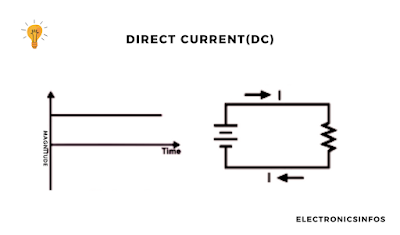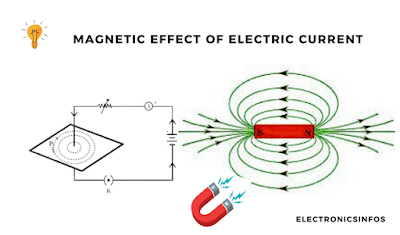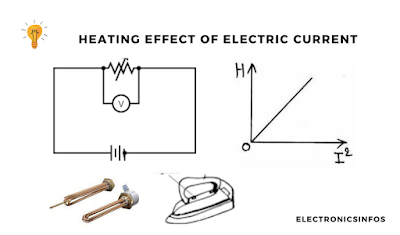What is an Electric Current?
The electrical current is the flow of free electrons or charge in a conductive material. Terminology varies based on different effects.
In electrical circuits, we refer to charge carriers or the flow of electrons. In the semiconductors, the terms shift to holes or electrons. When discussing electrolytes, the terminology changes to ions.
Electric current can be either direct current (DC), where the charge flows in one direction, or alternating current (AC), where the charge periodically changes direction.
In a circuit, electric current is driven by voltage, which creates a potential difference across the conductor.
The relationship between electric current (I), voltage (V), and resistance (R) is described by Ohm's Law: I = V/R. This equation highlights that the current is directly proportional to the voltage and inversely proportional to the resistance in a circuit.
Unit Of Electric Current
The SI unit of electric current is Ampere(A). When one Coulomb Charge flows in the medium per second is called one ampere. The Unit of charge is 'Coulomb' and the unit of time is 'second'.
I =Q/t
I = Coulomb/Sec
I = 1 Ampere
Types of Electrical current
- AC Electrical Current
- DC Electrical current
AC Electrical Current
AC current is called alternating current because it changes at every point. There are many examples of the application of AC in our daily lives. when you on a switch at your home to turn on the light it's alternating current.
The alternating frequency is 50hz or 60hz in different countries. when you plot an AC current with an oscilloscope W.r.t Time. you see it change at every point.
if you talk about which current is better AC or DC ? so we need to understand the comparison between AC and DC. we compare both supplies later. if we say how can I generate ac supply we simply need an alternator that produces ac supply or another option is we use a generator with slip rings that provide you ac supply.
 |
| Effect of Electrical Current |
DC Electrical Current
DC Electrical current is defined as a Direct current that does not change its direction W.r.t. Time. If you want to check the DC applications you can check car batteries, home ups batteries, solar batteries, DC power supplies, engines, lighting and ignition systems etc.
If you need to measure the DC current we use a DC ampere meter. so how can I generate the DC supply the main source of DC supply is a battery, DC generator etc
 |
| Effect of Electrical Current |
AC current VS DC current
AC current
- Alternating Currents periodically change its direction of flow every second.
- Standard power system frequencies of alternating current are 50 or 60 Hz.
- Alternating voltage varies in amplitude over time, creating a waveform.
- Alternating voltage does not have a fixed polarity, as the voltage alternates between positive and negative values during each cycle.
- Alternating current is well-suited for long-distance power transmission.
- Alternating current is commonly generated by devices like alternators.

AC current

DC current
- DC maintains a constant voltage polarity, with the positive and negative terminals remaining fixed.
- DC is less efficient for long-distance power transmission compared to AC.
- DC can be generated using various methods, including batteries, fuel cells, and rectifiers, converting AC to DC.
- DC is fundamental to the operation of electronic devices, computers, and digital systems.
- DC power sources can be easily regulated.
- The Frequency of Direct current is zero.
- Speed control of the DC generator is difficult.
 |
| DC Current |
Effect of Electrical Current
Three types of effects occur when the electrical current flow in the circuit including
- Magnetic Effect
- Heating Effect
- Chemical Effect
Magnetic Effect
When an electric current flows through a conductor, it generates a magnetic field around the conductor. The direction of this magnetic field is either clockwise or anticlockwise, depending upon the direction of the current. Assuming a uniform magnetic field exists in the circuit, placing a current-carrying conductor within this field causes mutual flux between the two fields, resulting in the formation of a resultant magnetic field. This resultant field exerts a force on the conductor, causing it to experience motion within the magnetic field.
 |
| magnetic Effect of Electrical Current |
Heating Effect
The heating effect is the phenomenon where electrical energy is converted into heat energy when an electric current flows through a conductor. This effect is also described by Joule's Law.
The heat produced (Q) = I²Rt
- represents the heat produced (measured in joules),
- is the electric current flowing through the conductor (measured in amperes),
- is the resistance of the conductor (measured in ohms), and
- is the time for which the current flows (measured in seconds).
The heating effect is used in electrical appliances such as toasters, electric stoves, and heaters.
 |
| heating Effect of Electrical Current |
Chemical Effect
When current is flowing in the electrolyte a chemical reaction happens that effect is called the chemical effect. The DC ampere-hour is worked on this principle. when current is flowing in the electrolyte it decomposes into particles According to the Faraday law the quantity of decomposing metal is a direct relation to current and time.
 |
| Effect of Electrical Current |
Magnetic effects
Ammeters, voltmeters, wattmeters, integrating meters, and most other electrical instruments.
Heating effect
Ammeters and voltmeters
Chemical effects integrating meters(DC ampere-hour meters)
integrating meters(DC ampere-hour meters)
Conclusion
Frequently Asked Questions – FAQs
How Can I Measure the Electric Current in any Circuit?
if want to measure the electric current we need an Ampere meter to measure the charge carriers in the circuit because charge carriers are called electric current. Do you know what connection we need to connect the ampere meter in the circuit Series or Parallel?
How Can I Connect the ampere meter to the circuit?
we connect the ampere meter to the series of wires that we need to measure.
What types of Ampere meter W.r.t Supply measurement?
There are two types of Ampere meter One is AC current meter and another one is a DC ampere meter.
Can we measure current without connecting the ampere meter in the circuit?
Yes, it's possible if you have a clamp-on meter you can measure easily because its working principle is electromagnetic induction.
Also, Read on Electronicsinfos!
What are electrical isolators?
Oil circuit breaker vs air circuit breaker
Surge Protectors Vs Power Strips
Electrical Safety Training Tips
5 Battey Backup Surge Protectors


-Electronicsinfos.png)



0 Comments
please do not insert spam links